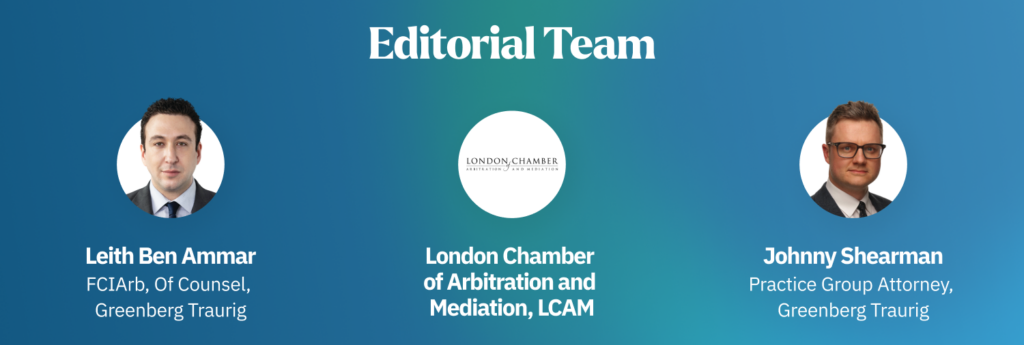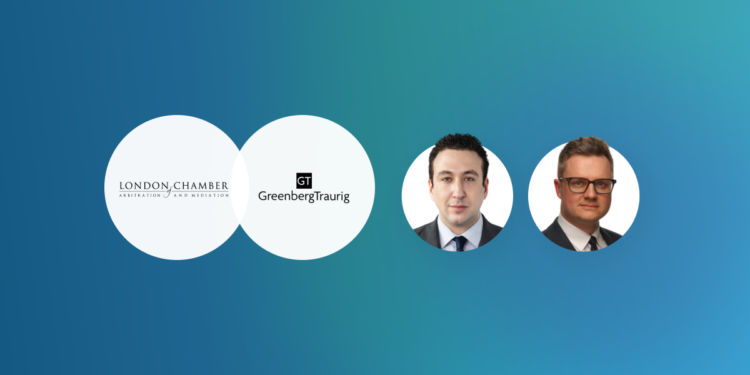THE AUTHORS:
Leith Ben Ammar, Of Counsel at Greenberg Traurig
Johnny Shearman, Group Practice Lawyer at Greenberg Traurig
London Chamber of Arbitration and Mediation, LCAM
The London Chamber of Arbitration and Mediation (LCAM) and Greenberg Traurig London have partnered on a series of articles looking at arbitration and emerging technologies. This easy to digest series provides an introduction to technologies such as smart legal contracts, generative AI, virtual and augmented reality and big data and considers their interplay with international arbitration. In collaboration with LCAM the series is edited by Leith Ben Ammar FCIArb and Johnny Shearman of Greenberg Traurig.
A contract is synonymous with law. It is the cornerstone of the legal industry, and it is easy to think that a traditional written contract cannot be bettered in some way. But smart legal contracts (“SLCs”) embody emerging technology and have the potential to be a key disrupter across the legal system.
Harnessing distributed ledger technology, SLCs can best be described as a legally binding contract in which some or all the contractual terms are defined in, or performed automatically by, a computer.
For example, SLCs can automatically receive data from various sources and implement certain actions through a series of if-then rules without third party authorisations or human interaction. This provides the parties to a SLC with an extremely high degree of certainty as to the performance of a contract.
By virtue of SLCs, there is the potential for contracts and transactions to become more efficient and transparent – payments may be made automatically, relevant data can be updated in real-time, and stakeholders can be polled in a secure and timely manner.
When asked to analyse the suitability of English law’s application to SLCs, the UK Law Commission concluded that no change was needed. This followed the UK Jurisdiction Taskforce’s (“UKJT”) legal statement that, in principle, smart contracts can give rise to binding legal obligations, enforceable in accordance with their terms. In essence, the law is there and ready to be applied, and the stage is set for SLCs to become an integral part of the legal system in England as well as globally in the near future.
However, the adoption of SLCs and the rise in their use will inevitably lead to disputes. Whilst many of these disputes will look and feel similar (or may be resolved by virtue of the self-executing function of the SLC itself), certain elements are likely to be novel. For example, it may not be possible to say with certainty where the platform on which the SLC is created and/or performed is located. It is also possible that the domicile of the contracting parties cannot be readily determined in the absence of sophisticated tracing. In such circumstances, where there is not a choice of law or dispute resolution mechanism, the choice of jurisdiction can be decided by identifying legal connections, such as the place of contractual performance, or the place of the acts that give rise to a liability. However, establishing these connections and identifying geographical locations can be difficult in the world of public, permissionless distributed ledger systems. Satellite disputes over such issues will only serve to increase time and costs for the parties involved.
The more acute consideration then, with the increased use of SLCs, is perhaps which institution is best placed to resolve the dispute. For many reasons, arbitration is well positioned to emerge as the preferred means of resolving SLC disputes.
English law already underpins 40% of corporate arbitrations, and as evidenced by the Law Commission and UKJT’s conclusions, tribunals determining matters under English law can already do so in relation to SLCs. But arbitration brings with it other benefits. It provides certainty as to jurisdiction, a neutral forum, access to pools of arbitrators with relevant experience and, in most instances, widely enforceable awards.
As arbitral bodies and procedures meet the needs of SLC disputes, this will, in turn, drive innovation within arbitration. Arbitration that offers the right balance between flexibility, efficiency and speed will be the dispute resolution forum chosen to resolve the SLC disputes of today and tomorrow.
ABOUT THE AUTHORS:
Leith Ben Ammar FCIArb is Of Counsel and Co-Chair of Greenberg Traurig’s London office Ability Network. His practice focuses on complex, high value and sensitive international dispute resolution. Leith is a qualified arbitrator and Fellow of the Chartered Institute of Arbitrators. As counsel, he represents clients from Europe, Africa, Asia, America and the Middle East across multiple sectors. He has particular experience in disputes involving very large and technologically complex infrastructure, energy and real estate projects in emerging markets. Leith also has in-depth knowledge of legal issues involving international arbitration and emerging technology. He is the Co-Chair of ENERAP’s UK Chapter, a former supporting expert at the University of Oxford’s Entrepreneurship Centre and an alumnus of its Blockchain Strategy Programme.
Johnny Shearman is a Group Practice Lawyer at Greenberg Traurig LLP. Johnny is dispute resolution lawyer and has gained significant experience in handling a broad spectrum of domestic and international disputes. His legal knowledge encompasses complex contractual and tortious disputes, civil fraud and asset recovery, banking and professional negligence litigation and contentious insolvency matters. His experience includes disputes at all levels from County Court to Supreme Court proceedings, as well as international arbitration.
London Chamber of Arbitration and Mediation, LCAM, is part of the London Chamber of Commerce and Industry (“LCCI”) but independent in its administration of disputes. LCAM was launched to provide innovative, speedy, and cost effective services to help resolve commercial disputes. LCAM offers arbitration, expedited arbitration, and mediation services delivered by a diverse panel with many years’ experience in alternative dispute resolution. LCAM’s Model Mediation Procedure provides a framework for an effective and confidential mediation process. Oversight is provided by the LCAM Advisory Board. Fees are fixed, providing cost-certainty and good value without compromising quality.

The views and opinions expressed in articles posted on Daily Jus are those of the authors and do not reflect the official policy or position of Daily Jus.





